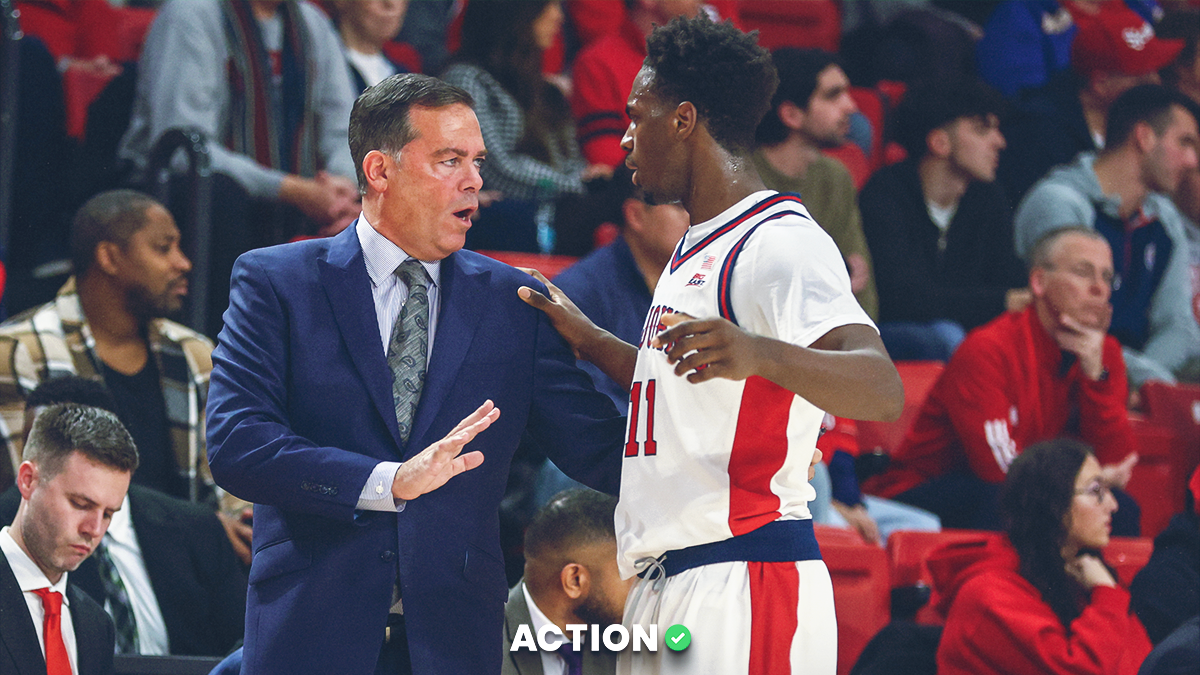Thursday will mark five years to the day since the UMBC Retrievers pulled off the most shocking upset in NCAA Tournament history. That, of course, is when they became the first 16-seed to knock off a 1-seed in the men's tournament.
Ever.
Sadly, for me, I remember that day all too well because I am a lifelong Virginia Cavaliers fan — they were the 1-seed that UMBC upset that day.
Thursday, in my opinion, also presents the best opportunity for it to happen again since that fateful day five years ago.
In fact, the similarities are so strikingly similar, it's eerie how it's lined up exactly five years to the day. Let's dive in.
The Similarities
Efficiency
In 2018 the Virginia Cavaliers were not just a 1-seed, but they were also the No. 1 overall seed in the tournament and the top-ranked team in Ken Pomeroy's ratings.
This year, Houston is the top-rated team by Kenpom.
If we look at what goes into those metrics, namely Adjusted Offensive and Defensive Efficiencies, as well as Adjusted Tempo, here's how the teams compare (national rank in parenthesis):
| 2018 UVA | 2023 Houston | |
| AdjO | 116.5 (21) | 118.4 (11) |
| AdjD | 84.4 (1) | 89.6 (4) |
| AdjT | 59.2 (351) | 63.3 (343) |
Both teams were elite on both ends of the court, albeit even more so on the defensive end, while playing at a grind-it-out pace.
That's notable because offensive efficiency is slightly more predictive of deep tournament runs than defensive efficiency. Meanwhile, a slow pace helps underdog teams because the more efficient team does not have as many chance to realize their long-term efficiency, often keeping games closer.
Houston did play about four possessions faster per game, but as we'll see, that's negated by Northern Kentucky's slower pace than UMBC. Let's look at how those two teams compare:
| 2018 UMBC | 2023 N. Ky | |
| AdjO | 103.4 (208) | 103.3 (217) |
| AdjD | 105.3 (170) | 102.8 (121) |
| AdjT | 68.2 (177) | 62.0 (358) |
Again, similar efficiency profiles. Notably, Northern Kentucky is slower paced to counterbalance Houston's slightly quicker pace than UVA. As a result, both games projected at 60 possessions!
But there's more.
The 3-Point Game
One thing that increases variance is 3-point shooting. Both the 2018 Cavaliers and this year's Cougars force teams to shoot from outside. UVA allowed a 40.8% 3PA/FGA ratio, while Houston's is even higher at 43.7%.
This gives the opponent an opportunity to get hot from downtown, and as I'll discuss in the UMBC and Northern Kentucky comparison, both teams are primed to take advantage of that.
UMBC launched 44.3% of their field goal attempts from three, while Northern Kentucky attempts 40.7% of its shots from beyond the arc compared to a national average of 37.4%. Both teams are also above average in making 3s, with UMBC making 38.2% and Northern Kentucky 35.2%.
Turnovers
In low-possession games, each possession becomes magnified in its importance. That means turnovers play a huge factor.
Both UVA and Houston were solid at protecting the ball going into their respective tournaments. Virginia turned the ball over on just 14% of possessions, while Houston a bit higher at 15.3%, still well below the national average of 18.3%.
However, UMBC was 45th in the nation at forcing turnovers. Northern Kentucky is even better, causing opponent to cough up the ball at a 23.2% rate, good for 13th in the nation.
On the other side of the ball, UMBC was solid at protecting the ball, ranking 45th in Turnover Percentage. But Northern Kentucky ranks even better, coming in at 13th in the nation in ball protection.
So while the Cougars are a strong defensive team at forcing opponents into mistakes, it's going to be much tougher sledding against their opponents on Thursday.
Injuries and Depth
Virginia went into the NCAA Tournament without their best player, DeAndre Hunter, who suffered a broken wrist prior to the tournament. Losing your best player is a big loss, but it hurts even more when that forces your team into a seven-man rotation.
This could play out for Houston, whose leading scorer Marcus Sasser, at the time of this writeup on Tuesday, is uncertain to play in this first-round game against Northern Kentucky. That too would force the Cougars into a likely seven-man rotation, which they used in their conference championship loss to Memphis.
Foul Trouble
The lack of depth got exposed even more when UVA experienced early foul trouble. Both Devon Hall and Isaiah Wilkins picked up two early fouls. That's quite notable because UVA committed fouls at a bottom-25 rate in the country going into the game, while UMBC wasn't particularly adept at drawing fouls, with a 30.8% FTA/FGA ratio, just slightly better than the national average.
Houston fouls at a much higher rate, coming in at 286th in the nation, so there's a much bigger chance they get into early foul trouble than UVA had going into the game. Northern Kentucky has the exact same 30.8% FTA/FGA ratio as UMBC had.
Schedule
Northern Kentucky actually compares favorably to the 2018 UMBC team in terms of schedule.
Northern Kentucky has the 60th-best non-conference strength of schedule per Kenpom, while UMBC was just 277th.
Northern Kentucky also has picked up the bigger regular season win between the two teams, defeating Cincinnati by seven points. That same Bearcats team played Houston to a six-point game on the road.
Meanwhile, UMBC's best win in 2018 was, ironically enough, against the 2018 Northern Kentucky squad.
Differences
There's a ton of similarities between the two games, but I'd be doing you a disservice if I didn't mention the differences.
For me, the most striking difference is on the glass.
Under Tony Bennett, Virginia typically prefers to get back on defense than sell out for offensive boards. As a result, they ranked 235th in Offensive Rebound Percentage. Houston, on the other hand, ranks fourth in the nation.
That is somewhat counteracted by the fact that UMBC was terrible on the offensive glass themselves, while Northern Kentucky is much better, but overall there is definitely a bigger rebound advantage to the Cougars this year than the Cavaliers had in 2018.
Final Thoughts
While I don't expect this result to happen — and nobody should given it's only happened once in the history of the tournament — there are enough striking similarities that I'd rank this as the most likely opportunity for a 16-seed to win since UMBC's stunning victory five years ago.
Remember, the Retrievers won by 20 ([) points in 2018. Northern Kentucky doesn't need to do that. Just a one-point win will do.
Which reminds me. Houston doesn't shoot free throws as well as that UVA team, should they have a small lead late in the game. Houston ranks 39th of the 68 tournament teams in free throw percentage.
While the current line of 19.5 is a pass for me, I would take them at anything better than +19.5. It's quite possible we see a 20 pop up as Houston is getting 81% of the bets and 73% of the money.
I even give Northern Kentucky about a 7% chance to win this game. To avenge my Virginia Cavaliers on the fifth anniversary of their historic loss, I'll be rooting for a second one on Thursday.
Pick: Lean Northern Kentucky +19.5, Bet at +20 or Better. |

















































